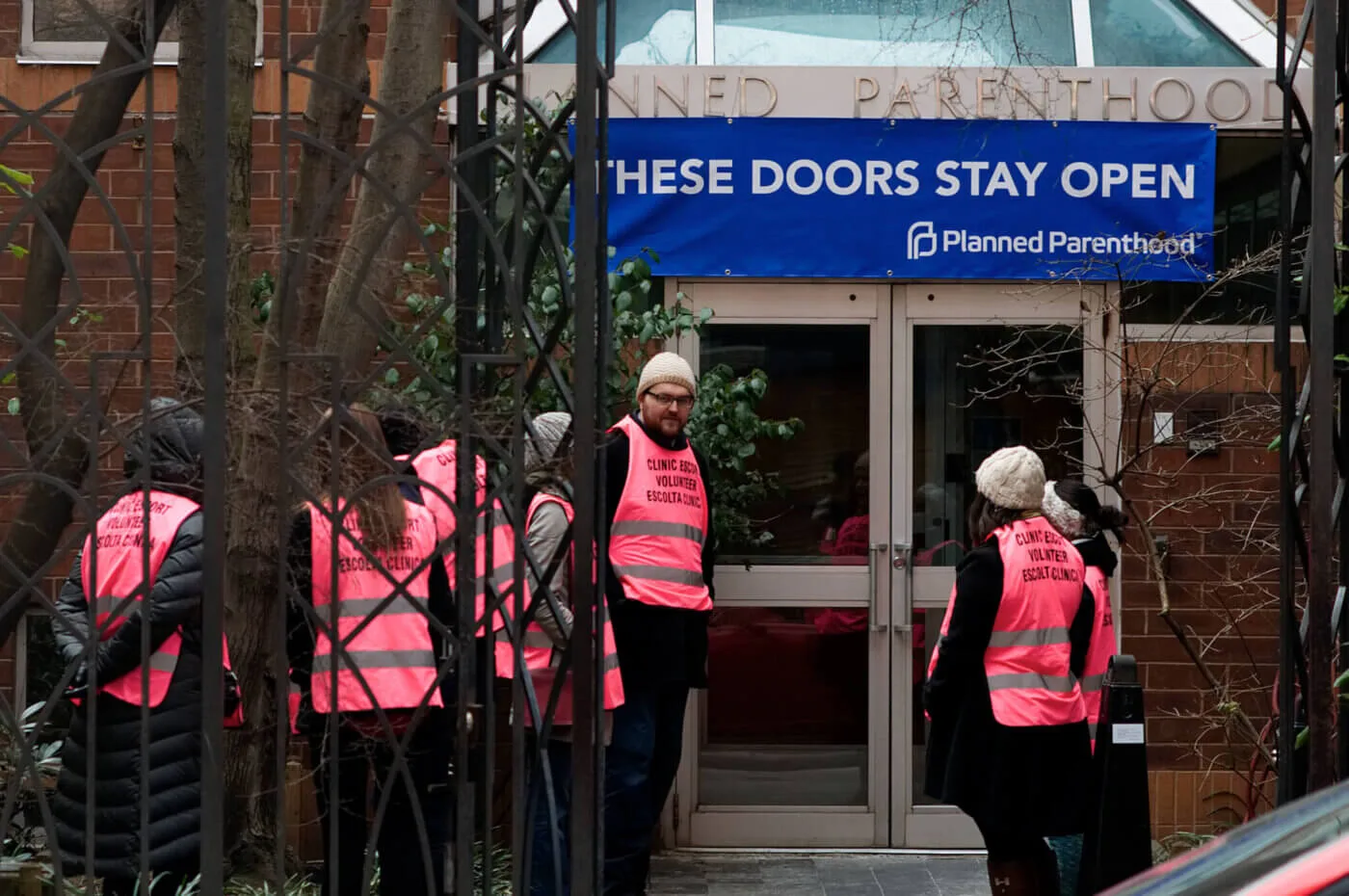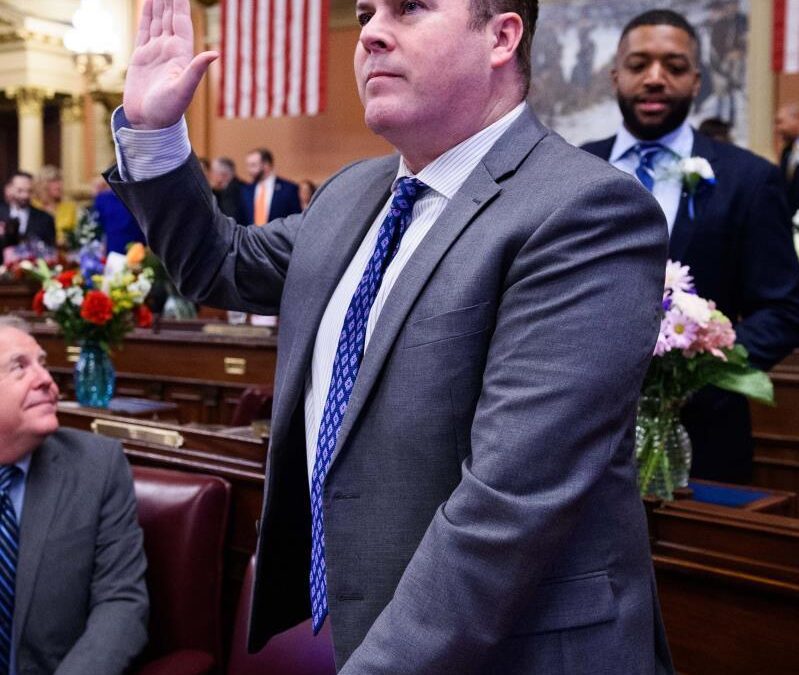
Planned Parenthood volunteers stand outside a clinic to grant clients free access to the facility without being harassed by protestors. (Photo by Bastiaan Slabbers/NurPhoto via Getty Images)
A GOP-proposed constitutional amendment banning abortions in Pennsylvania could leave the future of reproductive rights up to the voters.
The governor’s veto pen has been the last line of defense in Pennsylvania from a GOP-led state Legislature hellbent on banning abortion rights.
But even the hope of a potential Democratic successor to Gov. Tom Wolf in Harrisburg might not be enough to safeguard reproductive rights in the commonwealth as Republican lawmakers strategize to find a way around the veto pen.
With the US Supreme Court overturning Roe v. Wade last week, the federal protection of abortion rights that had been in place nearly 50 years no longer exists. The decision on abortion is now left with the states.
Pennsylvania’s current law on abortion allows for the termination of a pregnancy up to 24 weeks. State Republicans have repeatedly pushed legislation that would limit access to abortion care. Democratic Gov. Tom Wolf has shot down every attempt.
With Wolf near his term limit, all eyes are on Democratic nominee Josh Shapiro to take over and continue to veto proposed abortion bans. He is a staunch supporter of reproductive rights.
Republican nominee and state Sen. Doug Mastriano (R-Franklin) supports a full ban on abortions without exceptions for rape, incest, or the mother’s health.
Without a pro-life ally in the governor’s office, Republican lawmakers have decided they will attempt to ban abortions through amending the state constitution.
How Republicans Can Enact an Abortion Ban in Pennsylvania
State Sen. Judy Ward (R-Blair) introduced Senate Bill 956 in January. It proposes amending the state constitution to clarify that there is no right to an abortion or taxpayer funding of abortions within the Pennsylvania constitution. It is currently being considered for vote by the state Senate, and with a GOP majority it’s almost sure to pass.
Because SB 956 amends the constitution, it will have to win support in the House and Senate in two consecutive sessions. Then it goes straight to a ballot vote, effectively bypassing the governor’s veto pen. The earliest Pennsylvanians could vote on the amendment would be spring 2023.
The only possible chance of the amendment not being passed through the legislature would be if Democrats took over the majority in either house in November’s election. All 203 of the state’s House seats and half of the Senate seats are up for re-election.
Since Pennsylvania’s current constitution went into effect in 1968, voters have rejected only six of 49 proposed amendments that made it to the ballot. Only 14 of those appeared during presidential or gubernatorial election years, races that typically have higher turnouts.
Since the latest two-year session began in January 2021, Democratic and Republican legislators have proposed more than 70 changes to the state constitution.
Can a Constitutional Amendment be Challenged in Court?
Once a constitutional amendment is passed by the voters, there is not really an opportunity to fight it, according to Sara Rose, deputy legal director for the American Civil Liberties Union of Pennsylvania.
“The only substantive challenge to a state constitutional amendment would be if it conflicted with a federal law or the federal constitution, because federal law takes precedence over state law,” Rose said.
In the wake of the recent Supreme Court decision to overturn Roe v. Wade, that argument is now moot.
Julie Zaebst, senior policy advocate for ACLU of Pennsylvania, said the organization is keeping a close eye on the progress of the amendment in Pennsylvania, and has vowed to mount a campaign to try and defeat it if it makes it to the voters. Similar campaigns are currently underway in Kansas and Kentucky where constitutional amendments to ban abortions are already slated to be voted on this year.
“One of the realities at this moment is that the federal decision is so monumental we are all scrambling to find out what this means,” Zaebst said.
Politics

Malcolm Kenyatta makes history after winning primary for Pa. Auditor General
State Rep. Malcolm Kenyatta, who was first elected to the state House in 2018, won the Democratic nomination for Pa. Auditor General and will...

Biden administration bans noncompete clauses for workers
The Federal Trade Commission (FTC) voted on Tuesday to ban noncompete agreements—those pesky clauses that employers often force their workers to...

Philadelphia DA cancels arrest warrant for state Rep. Kevin Boyle on eve of Pa. primary
Philadelphia District Attorney Larry Krasner said a detective had sought the warrant against Boyle, a Democrat whose district includes a section of...
Local News

What do you know about Wawa? 7 fun facts about Pennsylvania’s beloved convenience store
Wawa has 60 years of Pennsylvania roots, and today the commonwealth’s largest private company has more than 1,000 locations along the east coast....

Conjoined twins from Berks County die at age 62
Conjoined twins Lori and George Schappell, who pursued separate careers, interests and relationships during lives that defied medical expectations,...






